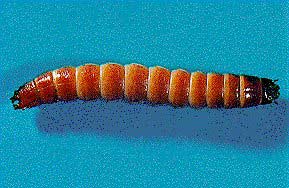
Wireworm larvae are hard, yellow to dark brown cylindrical worms that may reach 1/2 to 1 1/2 inches long when full grown. Adults are the familiar brown-black "click" beetles.
Wireworms reduce plant populations by attacking the seed or boring into the young plant. The plant will die if the growing point is destroyed. Damage usually shows up about a week or two after plant emergenge. Symptoms include wilted plants or skips in the stand.
These are a potential problem where corn follows grass or legume-grass sod. Several species can cause economic damage. There are no effective rescue treatments once damage is found in the field.
Preplant incorporated applications of liquid formulations of Diazinon, Lorsban or Mocap are registered for wireworm control in corn. This is economically impractical in most cases. Use of a soil insecticide at planting when destructive wireworm populations exist or are anticipated provides the best means of reducing stand loss.
| Insecticide | Application | Ounces / 1,000' row |
| Aztec 2.1% G | Band, T-Band, or furrow | 6.7 |
| Aztec 4.67% G | Band, T-Band, or furrow | 3 |
| Capture 2EC | 5 to 7" T-Band over open furrow | 0.3 |
| Capture 1.15% G | T-Band or furrow | 3.2 to 8 |
| Counter 15% G | Band or furrow | 8 |
| Counter 20% CR | Band or furrow | 6 |
| Force 3% G | Furrow | 4-5 |
| Fortress 5% G | T-Band or furrow | 3 |
| Lorsban 15% G | Band, t-band or furrow | 8 |
| Lorsban 4 E | Broadcast PPI | 2 qts/acre |
| Mocap 10% G | Band | 12 |
| Regent 4SC | Microtube injection or infurrow band | 0.24 fl oz/1000' row |
| Thimet 20% G | Band | 6 |